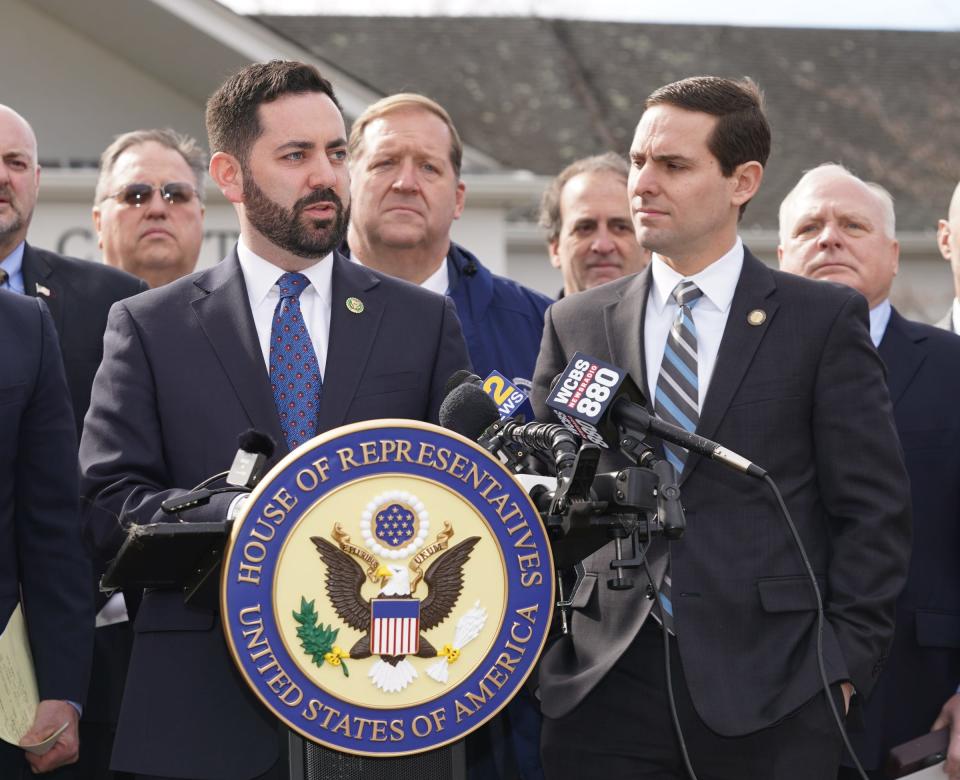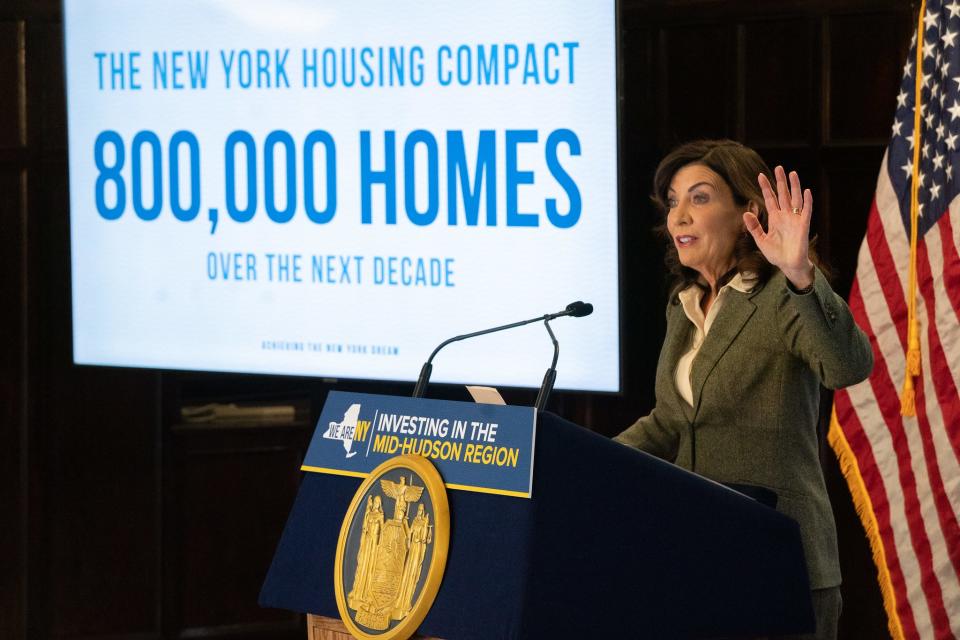NY lawmakers seek carrots, not sticks in Hochul's housing plans. Here's what they want
- Oops!Something went wrong.Please try again later.
Out with the mandates, in with the incentives.
New York lawmakers want to soften key pieces of Gov. Kathy Hochul's housing plans by encouraging rather than requiring them, and by offering municipalities payments as rewards for meeting her growth targets.
The Senate and Assembly each laid out its own version this week in counter-proposals to the budget Hochul introduced last month. Those competing ideas to prod new housing must now be debated — and reconciled, if possible — as legislative leaders and the administration try to finalize the state's annual spending plan by April 1.
Hochul started the push to confront a deepening housing shortage that has driven up home prices and rents, beyond reach for many. Her plans sought to overcome local development barriers — overly restrictive zoning and slow project reviews — and produce 800,000 new homes in New York over the next 10 years, double the pace of the last decade.
What are the most controversial parts of housing plan?
But two mandates she wants have met a flurry of objections: local housing-growth targets, and required rezoning around train and subway stations to allow dense housing. The alternatives unveiled this week attempt to quell the concerns of municipal leaders and state lawmakers from the Hudson Valley and Long Island.
On Wednesday, Hochul visited Westchester County — a key battleground in her housing crusade — to rally support at a gathering of local business leaders, held at a Rye Brook office building by the Business Council of Westchester. Their enthusiasm for her cause was evident: guests greeted the governor with a standing ovation as she entered the room.

She hopes to enlist them as vocal allies to help her win over lawmakers.
“I need every single one of you," she told the group, "to use your voice, the people who work for you - and I'm sure there's many - to activate, mobilize, bring support behind this and tell people, 'Don't be afraid. This is going to be good.'"
The housing debate has at least two sticking points besides the conflict over mandates.
Half of the 800,000 homes Hochul projects in her plans depend on state lawmakers replacing a lapsed tax incentive that encouraged developers to build affordable housing in New York City. She proposed extending the expired program for four years in her budget proposal; neither the Senate nor Assembly did so in theirs.
Another issue dividing the Democratic governor and Democrats who control the Legislature is added protections for renters. Both chambers included them in their budgets, with the Senate embracing the "good-cause eviction" proposal that tenant advocates have sought. Hochul did not.
Local data:How many new homes must your town OK to meet NY Gov. Hochul's targets? Check our database
Changes coming:NY lawmakers tip hand on Hochul's proposed housing mandates. What would they change?
What are NY lawmakers asking Hochul to change?
Here are key differences in the housing plans by the governor, the Assembly and the Senate:
Growth targets
Hochul: Every municipality in New York must approve enough new homes to increase their total housing by 3% (downstate) or 1% (upstate) within three years. The 3% target would apply to New York City and all towns, villages and cities on Long Island and in five Hudson Valley counties (Westchester, Rockland, Putnam, Orange and Dutchess).
Assembly: Same targets, but not mandatory.
Senate: Same targets, but not mandatory and with one change: Orange County's goal would be 1% instead of 3%. (Sen. James Skoufis, who represents most of Orange, secured that accommodation.)

Penalties and incentives
Hochul: Municipalities that miss their targets could instead make two zoning changes to spur housing. Those that do neither would be subject to “fast-track approval.” Local boards would face deadlines to decide on housing projects, and developers could appeal denials to the courts or a new state board. Fast-tracked plans wouldn't have to comply with local zoning.
Assembly: No fast-track approvals. Budgets $500 million for incentive payments to municipalities outside New York City that reach their housing targets. Another $125 million set aside for New York City for same purpose.
Senate: No fast-track approvals. $500 million budgeted to reward municipalities that hit their targets, to be distributed by a new land use advisory council. Those places also would get a 10% increase in state aid and a higher score on state grant applications.

Transit-oriented development
Hochul: Municipalities must rezone areas within a half-mile radius of train and subway stations to allow housing complexes known as transit-oriented development. Mandate would affect New York City and places in surrounding area served by commuter trains: Long Island and five Hudson Valley counties (Westchester, Rockland, Putnam, Orange and Dutchess).
Assembly: No rezoning required. But additional weight given to transit-oriented housing in meeting growth target.
Senate: No rezoning required. But new rules would try to spur transit-oriented development by easing local approvals.
Housing push:How Kathy Hochul plans to speed home building in NY — and the resistance she'll face
Other funding
Hochul: $20 million for municipalities to update their zoning, and $250 million for infrastructure to support new housing (plus an added $150 million in existing funds earmarked for the Hudson Valley — the "Mid-Hudson Momentum Fund").
Assembly: Doubles Hochul's infrastructure funding to $500 million.
Senate: Same as Assembly.
Journal News staff writer Peter Kramer contributed to this report.
Chris McKenna covers government and politics for the Journal News and USA Today Network. Reach him at cmckenna@gannett.com.
This article originally appeared on New York State Team: NY lawmakers counter Hochul ohousing with incentives, not mandates

